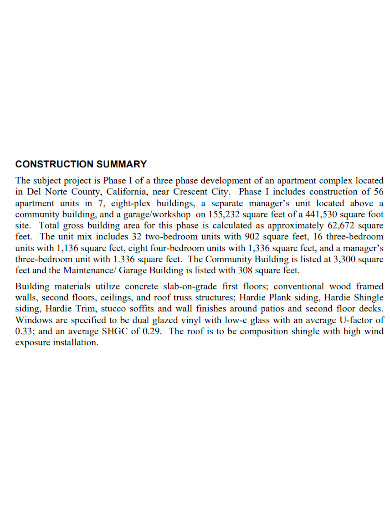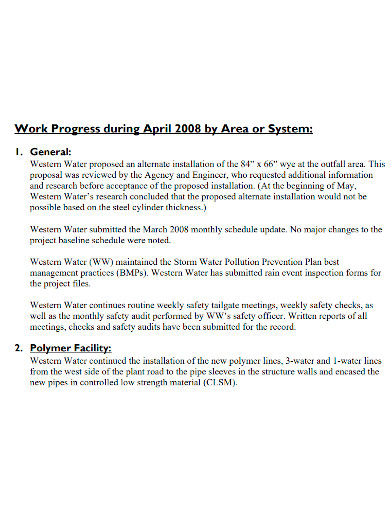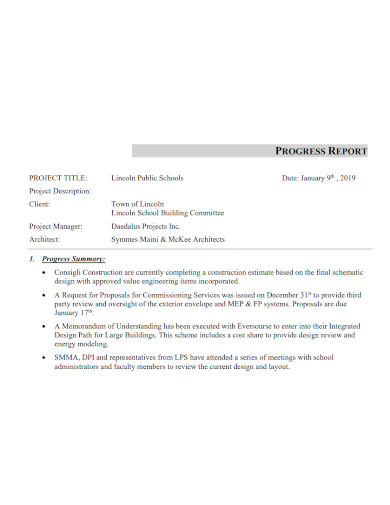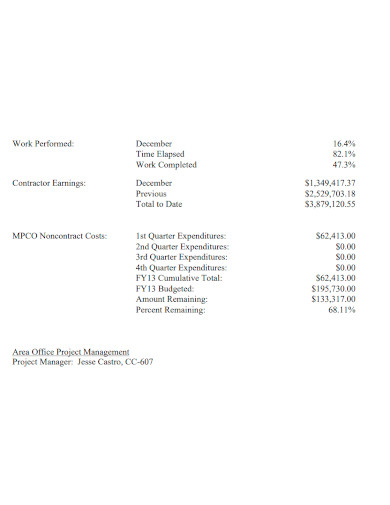When in the middle of a project development, project supervisors and project developers usually ask their employees to submit a progress report. Progress reports are documents that keep track of a project’s overall progress as it moves along development. Progress reports are prepared often regularly, usually a month or a week, for employers to provide themselves a summary of what has been achieved and overall progress of the team in an established span of time. This gives the employees an opportunity to review their work and how they have contributed to the project, and to the entire team. One the other hand, employers can use this document to keep track of the employee’s performance on the construction site and effectively delegate certain tasks at hand.
Progress reports are essentially just an overview of what an employee has been up to in a given work-time. The shape, size, and scale of a project doesn’t really matter. If you want to keep track of the overall progress of a construction project that you and your team have been working on, then writing a progress report is certainly the right step to take. Progress reports work really well with large scale projects such as building construction because it can be quite difficult to keep track of so many components at once without using some kind of tool. Depending on an employee’s experience with writing documents, they might get confused, anxious, or maybe even ready, when an employer asks them for a building construction progress report. But there really is no reason to fret, because we are here, and we are here to help. First off, check out these building construction progress report samples we have listed below just to help you get to know the document better, see what a well-written report looks like. You can then use these samples as a guide or even as a template, for when you’d finally want to make your own.
5+ Building Construction Progress Report Samples
1. Building Construction Progress Report
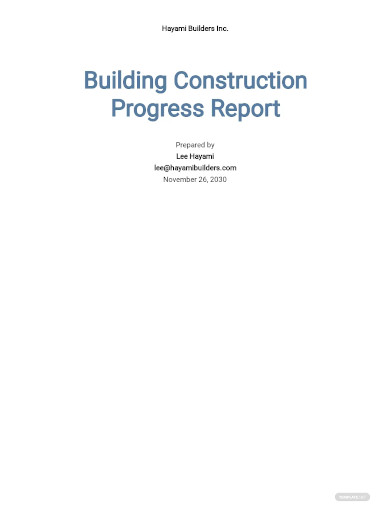
2. Building Construction Daily Progress Report
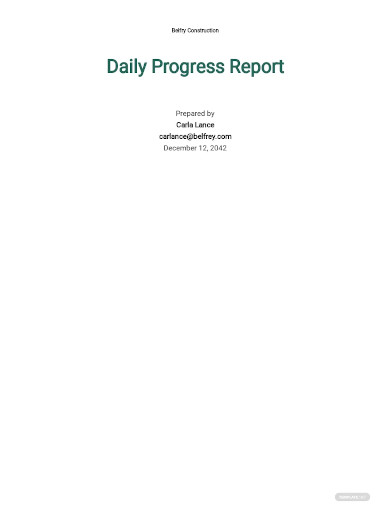
3. Building Construction Project Progress Report
4. Building Construction Work Progress Report
5. School Building Construction Progress Report
6. Standard Building Construction Progress Report
What Is a Building Progress Construction Report?
A progress report serves as a communication and coordination document between different departments working on a project or between the team and their respective project developers. The document is used to evaluate and keep track of the worker’s performance and progress, and it keeps the management informed on their respective achievements and accomplishments. The management is then able to develop construction site strategies and ensure that the output of every task is up to their satisfactions. It contains a quick recap of whatever happened on site in a span of a given time. Progress reports can also let the employees review tasks that they have done and completed, and then gauge which aspect needs improvement and which tasks they can work on best. On the other hand, employers can get a proper idea of the overall quality of an employee’s work, how their efforts contribute to the task at hand, give them a better sense of the pacing of the project, and how the team can continuously improve upon it.
How to Write a Building Construction Progress Report
Progress reports are an essential document to have in the workplace. We’ve already covered how important it is a couple of times so I suppose you already understand the need to properly draft it. Make sure that it is comprehensible and relatively easy to understand. It can be quite difficult to write for the first time, but breaking the writing process down to 5 simple components should make it a whole lot easier.
- Establish the purpose
It is vital to figure out the purpose of your progress report firsthand. Other than letting your supervisors know what has happened in their given time, what other pieces of information are they looking for? What are they expecting to see in your report? It’s usually the same things every time, unless your management says otherwise. The structure of a weekly progress report usually cover the progress of your building construction project, it’s current completion status, challenges that you or the team has encountered and how you ultimately overcame it, your weekly timeline, schedules, deliverables, and a rough plan for the next period. - Know your role
Be perfectly crystal clear with your role. What is your purpose? Make sure that you have a proper and complete grasp of what the definition of success for the project is or for the task that you are working on. - Layout
A progress report is more than just a couple paragraphs on a sheet of paper. In fact, that’s not a progress report at all. A proper report follows a well organized layout, short, concise, and visually appealing. There should be some sort of presentation to it, like you actually tried. This should ensure that your report is presentable and informative whilst remaining professional. The templates and samples provided above should be more than enough for you to get started but feel free to look for more samples online if you deem it necessary. - Characteristics
Weekly reports should really be short and concise. It should be brief and straight to the point, presented clearly in as few words as possible. But not to the point of vagueness. There is a fine line between overcompensation and just straight up nonsense, and you should be able to rest on the middle of the two. Don’t use too many work jargons as well. You may be submitting it to your superiors but they would generally appreciate it if it was easily understandable. - More details to keep in mind
- Summarize
- Proper dates and dating format
- Deliverables
- Titles
- Tasks and progress
- Results and achievements
- Challenges encountered
- Plans for the next work period and the future of the project
FAQs
What is a formal report?
Formal reports are official reports that contain important data and research information needed to make informed business decisions.
What is a construction progress chart?
It’s a chart prepared by a contractor and updated periodically. The principal trades of the project are tabulated vertically and the construction time shown horizontally.
What is a daily report in construction?
A construction daily report is a record comprised of notes, work completed, weather conditions, materials delivered, and materials used.
Building construction progress reports, or just any progress report in general, does have a lot of weight into it. Employers mostly depend on it to get a proper idea of what has been going on in the worksite, and if done poorly, could lead to miscommunication and losing track of the project itself. So be sure to keep in mind the tips we have given you in this article and to use the templates and samples we have provided for free.
Related Posts
FREE 15+ Sample Project Progress Reports
FREE 14+ Construction Cost Analysis Samples
FREE 11+ Construction Risk Assessment Samples
FREE 10+ Sample Job Progress Reports
FREE 10+ Construction Cash Flow Samples
FREE 10+ Sample Construction Risk Assessments
FREE 10+ Recommendation Report Samples
FREE 9+ Technical Report Samples
FREE 8+ Sample Project Quarterly Reports
FREE 7+ Sample Project Proposal Reports
FREE 26+ Sample Daily Reports
FREE 17+ Sample Handover Reports
FREE 11+ Construction Gantt Chart Samples
FREE 10+ Sample Student Reports
FREE 10+ Construction Project Management Samples

